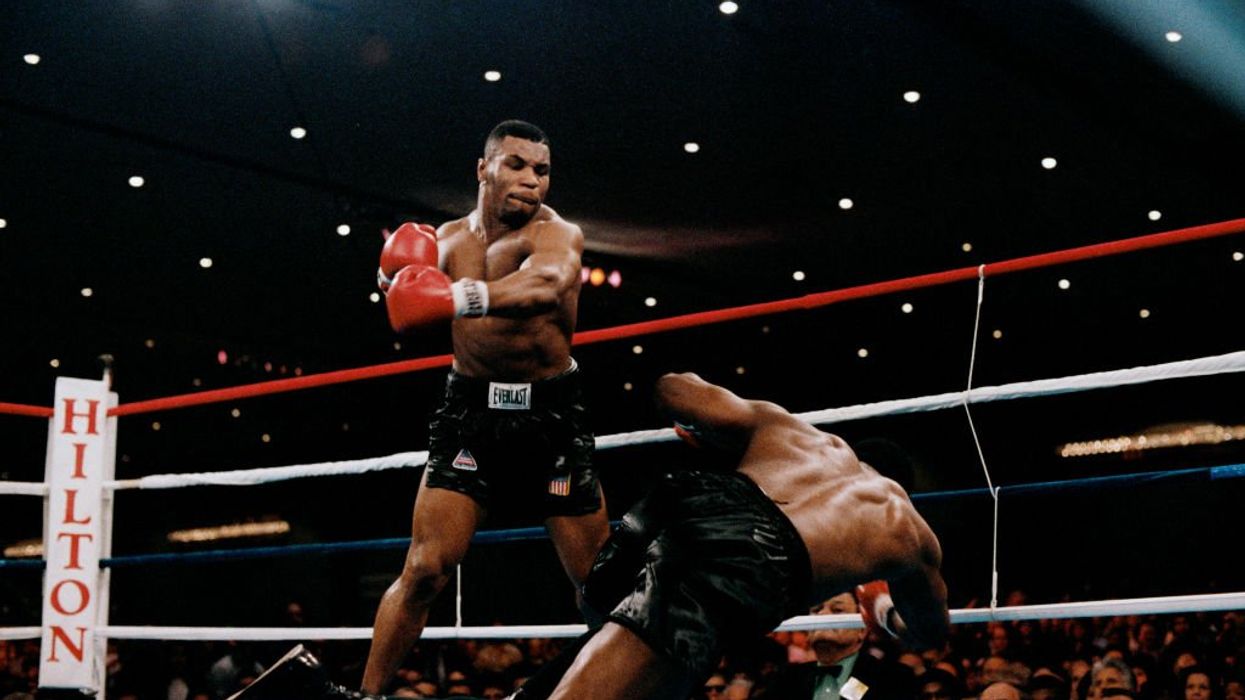
© 2025 Blaze Media LLC. All rights reserved.
Iraq, while clearly not yet possessing an ideal political culture, is freer and better represented than at any time in memory.
This column is part of our series reflecting on the Iraq War, which began ten years ago this week.
 U.S. Army Sgt. Kyle Whalen, 22, from Plover, Wis., playfully taps his helmet with an Iraqi boy’s donated toy football helmet during a visit to the boy’s school in Mosul, 360 kilometers (225 miles) northwest of Baghdad, Iraq on Wednesday, Nov. 5, 2008. Iraqi Army troops donated school supplies to children who attend the school. (AP Photo/Maya Alleruzzo)
U.S. Army Sgt. Kyle Whalen, 22, from Plover, Wis., playfully taps his helmet with an Iraqi boy’s donated toy football helmet during a visit to the boy’s school in Mosul, 360 kilometers (225 miles) northwest of Baghdad, Iraq on Wednesday, Nov. 5, 2008. Iraqi Army troops donated school supplies to children who attend the school. (AP Photo/Maya Alleruzzo)
On anniversaries, the inclination is to look back. But the 10th anniversary of the Iraq Invasion is the perfect time to take stock of where we are today in the Middle East.
Few will argue that we could not have “done” Iraq better. Then, again, one could easily argue that we could have done the Second World War and Korea better also.
But one indisputable upshot of the Iraq Invasion is that the U.S. and her allies successfully rid the Iraqi people of a homicidal dictator and set the conditions for a rudimentary democratic system. That development certainly helped plant the seeds that burst forth in last year’s the Arab Spring.
Across the Arab world, oppressed people saw that they did not have to be stuck with their own “Saddams” forever. While democratic movements do not always produce true economic freedom and benevolent leaders, it is a natural desire of people everywhere to hope for governments that put citizens first.
Al Qaeda tried to make Iraq the test case for its sick and twisted version of a new Islamic caliphate. The terrorist organization lost badly, and thousands of their adherents were killed—and not by just Western forces. Significantly, Iraqi security forces and Arab militias chose to fight with the outsiders who were trying to help (the U.S.-led coalition), and against the outsiders bent on establishing a new theocratic dictatorship (Al Qaeda). In a sense, Al Qaeda, once the darling of the Arab Street, wound up beings rejected by it—as evidenced in the initial Arab Spring uprisings. This was due in part because the terrorist’s ugly record of committing indiscriminate mass murders in Iraq, particularly of Sunni Arabs. Al Qaeda showed its true colors in Iraq, and so discredited itself.
An unfortunate result of the “success” in fighting the jihadis in Iraq has been the rise of Al Qaeda franchises around the Middle East and North Africa. Yes, Al Qaeda in Iraq was defeated, and thousands of Jihadists from outside Iraq who flocked there, died there. But Al Qaeda’s poisonous ideology is still out there, in a more dispersed form.
Despite the rhetoric from the Administration, the tides of war are NOT receding. The struggle is not yet over, and the danger is not gone. Please note, this not a danger caused by the war in Iraq. Al Qaeda declared war on the United States and the West a decade before coalition troops fired their first shots in Iraq, and the threat we still face would have been worse if not for the victories won in Iraq.
Some commentators have said that the real winner in the Iraq War was Iran, and that without the war Iran would be much less of a problem today. Nice thoughts, but they are not exactly rooted in facts, or even logic. Iran was a dedicated adversary long before the Iraq war, and continues to be a threat. Tehran’s mischief in the Syrian conflict reflects solely its perception of what best serves its national interests. It has nothing to do with ideology or religion, much less what happened in Iraq. The same holds true regarding Iran’s continued pursuit of nuclear weapons.
Today, America has the most experienced military (active and reserve) we have ever possessed. That fact should have brought considerable comfort to our friends and concern to our enemies. Unfortunately, we are on the verge of losing that considerable edge. As the Pentagon tries to cope with the third massive rounds of spending cuts in two years, it is becoming evident that our forces will not be able to train properly, to repair and reset equipment worn out from long-war usage, or to modernize to keep ahead of emerging threats. In short, America is on its way to a hollow military.
So, what’s the up-shot of the Iraq Invasion? Well, it certainly ousted an abhorrent dictator who had used nerve gas on his own people (Kurds) and against his neighbor (Iran). The world is a better place for being rid of Saddam and his sons. Iraq, while clearly not yet possessing an ideal political culture, is freer and better represented than at any time in memory. If Saddam Hussein had not been overthrown, he would still pose a major threat to his neighbors, the Iraqi people and American national interests today.
Yet the Middle East is far bigger than Iraq… or Iran, for that matter. It remains a dangerous and volatile place. But dictators of all sorts now know that they can be called to account, both by the international community, and by their own people. That is no small achievement. The only ones who are saying life would have been better if the U.S. had not acted are people who never had to live in Iraq.
Steven P. Bucci is director of the Allison Center for Foreign Policy Studies at The Heritage Foundation.
Related Contributions:
Want to leave a tip?
We answer to you. Help keep our content free of advertisers and big tech censorship by leaving a tip today.
Want to join the conversation?
Already a subscriber?
more stories
Sign up for the Blaze newsletter
By signing up, you agree to our Privacy Policy and Terms of Use, and agree to receive content that may sometimes include advertisements. You may opt out at any time.
© 2025 Blaze Media LLC. All rights reserved.
Get the stories that matter most delivered directly to your inbox.
By signing up, you agree to our Privacy Policy and Terms of Use, and agree to receive content that may sometimes include advertisements. You may opt out at any time.


